| MIATA BUILD |
|
|
 |  |
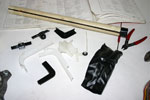 | April 8, 2007 - The wiring harness in the previous picture looked fairly simple, but these little guides and mounting brackets were all taped in to make sure it went where it was supposed to and it was protected.
It's always interesting seeing how a manufacturer deals with something like this. Despite the fact that it's been 13 years since the car was built, the wiring looks almost new.
entry 117 - tags: wiring |
 |  |
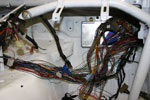 | April 8, 2007 - Despite the nice clean workbench in the last picture, here's where the work is really getting done.
Why? Because I want to get the wiring lengths right. The three plugs that supply my various signals are in different places, and the three plugs on the ECU are also arranged side by side. So the ideal length of every wire is different. It's not exciting, but it is engrossing work.
So much for my theory that it would be easier to test the harness on the bench.
entry 118 - tags: wiring |
 |  |
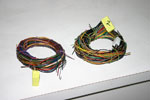 | April 8, 2007 - This is the wiring saved by moving the ECU to the firewall instead of the rear bulkhead.
It's shockingly heavy, especially when rolled up like this.
Race cars don't need as much wiring as street cars. There's no need for air conditioning or heaters, for example. Our aftermarket ECU also uses some onboard sensors or alternate sensors that use different wiring than the factory unit. Once it was wired in, I traced back all the unused wires from the stock plugs, confirmed that I didn't need them and then cut them out. Yes, it saves a few ounces but that's not the main purpose. The fewer wires there are in the harness, the easier it is to debug any potential problems in the future. Today I pulled out the wiring for the power windows (big fat wires - that was significant), the optional foglights (I'll probably wire in some lights myself in the future, but they'll need better wiring than the factory stuff), the mass air flow sensor (our ECU uses a MAP sensor instead), the diagnosis connector underhood (we can talk directly to the ECU) and a few other bits and pieces that aren't needed. The harness is getting simpler and simpler.
entry 119 - tags: wiring, weight loss |
 |  |
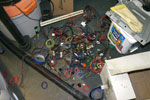 | April 9, 2007 - The great wiring exodus continues.
This pile may not look like all that much, but there's probably more wire out of the car now than in. The harness is getting much thinner and easier to work on.
It's amazing how much of a modern car's (assuming a 1994 Miata is considered "modern") wiring is due to the audio system. Between headrest speakers, door speakers and power antennas there's a lot of it snaked around the car. Imagine a car with a premium sound system!
entry 120 - tags: wiring, weight loss |
 |  |
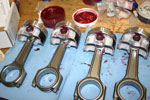 | April 10, 2007 - Time to stop playing with wires.
It's time to put the engine together. It's a fairly exotic piece, running high compression, a bore increased by 2mm and a stroke lengthened by 4mm. The rods are 6mm longer than stock to allow a good rod ratio for better revs. Flyin' Miata is using our car as a testbed for a high-end naturally aspirated powerplant, a change from the usual turbocharged beasts.
Due to the low compression height on the pistons, the wristpin is actually inside the oil rings. This means the rods have to be installed before the rings.
entry 121 - tags: engine |
 |  |
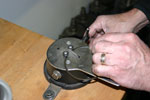 | April 10, 2007 - Bill Cardell from Flyin' Miata helps out by setting the ring gaps.
entry 122 - tags: engine |
 |  |
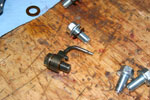 | April 10, 2007 - One trick for a little more naturally aspirated power is to remove the oil squirters.
They spray oil on the bottom of the pistons to keep them cool - excellent for forced induction, but in the case of naturally aspirated engines they rob some power by making the atmosphere in the crankcase denser. So the sprayers have been replaced with straight bolts.
entry 123 - tags: engine |
 |  |
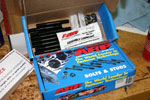 | April 10, 2007 - While the cams are designed for a good torque spread, we will have the ability to wind out the engine to about 9000 rpm if it proves worthwhile.
These ARP fasteners - developed with the help of Flyin' Miata - will help keep the bottom end together. Overkill perhaps, but at least we know the strength of the engine won't be questioned.
entry 124 - tags: engine |
 |  |
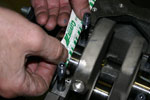 | April 10, 2007 - Even though the crank is a brand new one made for this application, it's still a good plan to check bearing clearances.
Right on target.
I hope the guy who invented Plastigauge retired rich. It's such a great tool - nothing more than a carefully produced strip of plasticine that is squashed and measured using the grid on the package. Cheap, easy to use and effective. Anyone can come up with a complicated and expensive solution to a problem, it's the simple ones like this that take a real brainstorm.
entry 125 - tags: engine |
 |  |
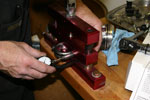 | April 12, 2007 - With the rings all set and everything assembled, it's time to put the piston and rods in the block.
First, we need to determine the required torque on the crank bolts. This is done by measuring the unstressed length of the bolt and then tightening it up until it's 0.005" longer. The rod is being held in a vice designed exactly for this purpose.
entry 126 - tags: engine |
 |  |
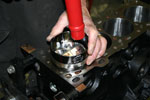 | April 12, 2007 - Tap tap tap goes the piston into the block.
The black cylinder is a ring compressor. Once the piston is in place, the bearing clearances are checked on the big ends of the rods, then everything is lubricated with red assembly lube and torqued up.
It's not fast work. It's a long time since I last built an engine and I'm working methodically with a lot of help from Bill Cardell. Things should go more quickly from this point, as things only need to be assembled once instead of twice. By the end of the weekend I want the shortblock done, ready for the tardy head to arrive.
entry 127 - tags: engine |
 |  |
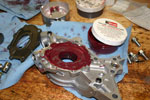 | April 16, 2007 - The oil pump was disassembled and filled with Redline assembly lubrication.
Some Miata engine builders say this isn't necessary, but I feel more comfortable with an oil pump that's primed and ready to go.
entry 128 - tags: engine |
 |  |
 | April 16, 2007 - In 2001, Mazda added a Main Bearing Support Plate to the Miata engine (top).
It's basically a super windage tray that bolts on to four of the main caps. The 1994-00 version is below. It needs a bit of modification to clear the ARP studs - the larger outer holes in each little "valley" are ones I added for this purpose.
Right, there's that done - but I don't seem to have a 2001 oil pan! Whoops. So maybe I'll have to go with the earlier design after all this.
entry 129 - tags: engine, interchange |
 |  |
 | April 17, 2007 - The engine comes together.
It's been a really slow process, mostly because I've been hunting down all the fasteners and miscellaneous bits and pieces that are scattered all over Flyin' Miata. I didn't strip the engine down, and in the long time it's been apart many of the components were liberated for other uses. This even includes the piston rings! So it's a minor victory when even one part is installed.
Several parts are installed, however. I investigated modifying a pre-2001 oil pan to work with the bearing support plate, but no luck. So it's the earlier design that got installed. Once the pan was on, I flipped the engine over to keep working on the water pump. Hmm, those pistons don't look right...
entry 130 - tags: engine |
 |  |
 | April 17, 2007 - The engine is going to have to come apart again.
I'm still trying to sort out why, but the pistons are standing proud of the block. Not good. Usually I'd do a quick check of this after installing the first piston, but this was the third engine built with pistons from this batch so I was pretty confident everything was good.
Well, it was supposed to have been built with known pistons. A check of the paperwork indicates that an experimental set of pistons intended for use with a stock crank may have ended up in the motor. I need to do some more checking on this.
Whatever the reason, it appears I'll be tearing it all apart again. At least I know the clearances are good now. Sigh.
entry 131 - tags: engine |
 |  |
April 18, 2007 - Much rejoicing!
The engine still has to come apart, but the correct pistons have surfaced. After combing through old paperwork to ensure they did in fact exist, the pistons were found in a dusty box inside another dusty box in the back corner of the FM shop. How they got there is a bit of a mystery, but the end result is that I just need to pull the oil pan off (yuk, lots of silicone sealant involved), pop the rods and pistons out then swap the pistons over. The bore is the same and Wiseco is very accurate on boring. The rings are the same as well, so all the difficult and tedious work does not need to be repeated.
Phew! This is a relief. The pistons that are currently in the block are a unique set, intended to combine the long stroker rods with a stock crank in order to obtain a very good rod ratio. The pistons that I'm supposed to have use the same rods but with a different crank. There's only one set of those in existence as well - so it would have been a long wait if I'd had to have another set made.
entry 132 - tags: engine |
 |  |
April 18, 2007 - A request for the RSS readers.
I know there are a few people out there using the RSS feed to watch the site. I'm doing a bit of an experiment - please check out an updated feed at http://targamiata.com/rssplus.php and let me know what you think. I'm new at this RSS stuff.
entry 133 - tags: announcements |
 |  |
 | April 19, 2007 - Time to change out the pistons.
The new ones have a much shorter crown on them for some reason. They were supposed to be the same compression ratio, I'm not sure why there's such a difference.
entry 134 - tags: engine |
 |  |
 | April 19, 2007 - One good side effect of the piston swap (other than the fact that the new ones won't slam into the head) is that while the pan was off, Bill found a 2001 version ready to install.
Just in time, too - I already had the sealant on the windage tray. So the main bearing support plate went on. Woohoo!
entry 135 - tags: engine, interchange |
 |  |
 | April 19, 2007 - The oil pan is sealed with a big bead of black silicone.
It's a little unnerving, because if you don't get it all sealed then you get the pleasure of pulling the engine out again. Yuk.
This silicone is "The Right Stuff", the favorite at Flyin' Miata. The black color also looks more professional than orange or grey, as it unavoidably squeezes out of the seams.
entry 136 - tags: engine |
 |  |

 THE DIARY
THE DIARY